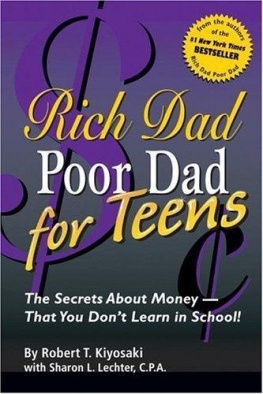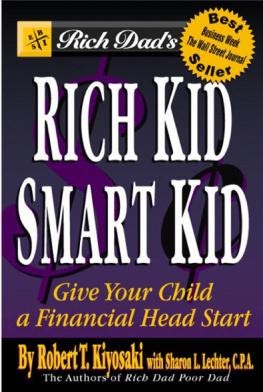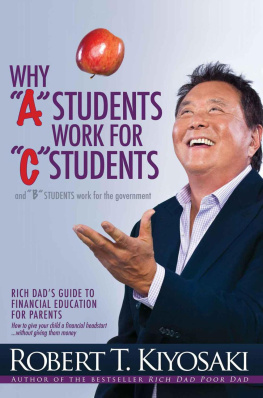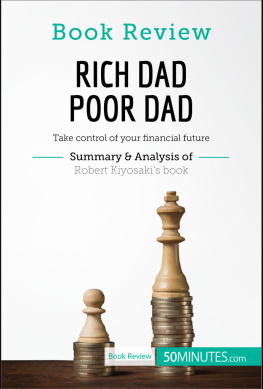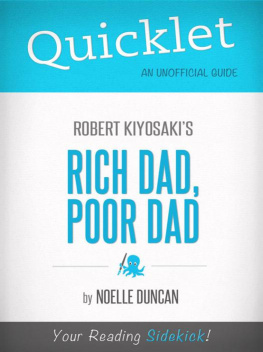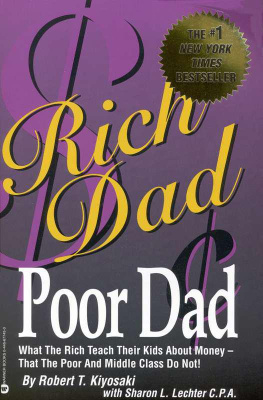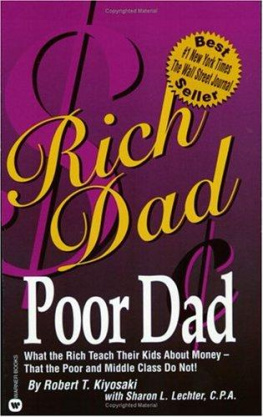Robert T. Kiyosaki - Rich Dad Poor Dad for Teens: The Secrets about Money--That You Dont Learn in School!
Here you can read online Robert T. Kiyosaki - Rich Dad Poor Dad for Teens: The Secrets about Money--That You Dont Learn in School! full text of the book (entire story) in english for free. Download pdf and epub, get meaning, cover and reviews about this ebook. year: 2012, publisher: Plata Publishing, genre: Detective and thriller. Description of the work, (preface) as well as reviews are available. Best literature library LitArk.com created for fans of good reading and offers a wide selection of genres:
Romance novel
Science fiction
Adventure
Detective
Science
History
Home and family
Prose
Art
Politics
Computer
Non-fiction
Religion
Business
Children
Humor
Choose a favorite category and find really read worthwhile books. Enjoy immersion in the world of imagination, feel the emotions of the characters or learn something new for yourself, make an fascinating discovery.
- Book:Rich Dad Poor Dad for Teens: The Secrets about Money--That You Dont Learn in School!
- Author:
- Publisher:Plata Publishing
- Genre:
- Year:2012
- Rating:4 / 5
- Favourites:Add to favourites
- Your mark:
- 80
- 1
- 2
- 3
- 4
- 5
Rich Dad Poor Dad for Teens: The Secrets about Money--That You Dont Learn in School!: summary, description and annotation
We offer to read an annotation, description, summary or preface (depends on what the author of the book "Rich Dad Poor Dad for Teens: The Secrets about Money--That You Dont Learn in School!" wrote himself). If you haven't found the necessary information about the book — write in the comments, we will try to find it.
Rich Dad Poor Dad for Teens: The Secrets about Money--That You Dont Learn in School! — read online for free the complete book (whole text) full work
Below is the text of the book, divided by pages. System saving the place of the last page read, allows you to conveniently read the book "Rich Dad Poor Dad for Teens: The Secrets about Money--That You Dont Learn in School!" online for free, without having to search again every time where you left off. Put a bookmark, and you can go to the page where you finished reading at any time.
Font size:
Interval:
Bookmark:
Rich Dad, Poor Dad
By Robert T. Kiyosaki
INTRODUCTION
There is a Need
Does school prepare children for the real world? Study hard and get good grades and you will find a high-paying job with great benefits, my parents used to say. Their goal in life was to provide a college education for my older sister and me, so that we would have the greatest chance for success in life. When T finally earned my diploma in 1976-graduating with honors, and near the top of my class, in accounting from Florida State University-my parents had realized their goal. It was the crowning achievement of their lives. In accordance with the Master Plan, I was hired by a Big 8 accounting firm, and I looked forward to a long career and retirement at an early age.
My husband, Michael, followed a similar path. We both came from hard?working families, of modest means but with strong work ethics. Michael also graduated with honors, but he did it twice: first as an engineer and then from law school. He was quickly recruited by a prestigious Washington, D.C., law firm that specialized in patent law, and his future seemed bright, career path well-defined and early retirement guaranteed.
Although we have been successful in our careers, they have not turned out quite as we expected. We both have changed positions several times-for all the right reasons-but there are no pension plans vesting on our behalf. Our retirement funds are growing only through our individual contributions.
Michael and I have a wonderful marriage with three great children. As I write this, two are in college and one is just beginning high school. We have spent a fortune making sure our children have received the best education available.
One day in 1996, one of my children came home disillusioned with school. He was bored and tired of studying. Why should I put time into studying subjects I will never use in real life? he protested.
Without thinking, I responded, Because if you don't get good grades, you won't get into college. Regardless of whether I go to college, he replied, I'm going to be rich.
If you don't graduate from college, you won't get a good job, I responded with a tinge of panic and motherly concern. And if you don't have a good job, how do you plan to get rich?
My son smirked and slowly shook his head with mild boredom. We have had this talk many times before. He lowered his head and rolled his eyes. My words of motherly wisdom were falling on deaf ears once again.
Though smart and strong-willed, he has always been a polite and respectful young man.
Mom, he began. It was my turn to be lectured. Get with the times! Look around; the richest people didn't get rich because of their educations. Look at Michael Jordan and Madonna. Even Bill Gates, who dropped out of Harvard, founded Microsoft; he is now the richest man in America, and he's still in his 30s. There is a baseball pitcher who makes more than $4 million a year even though he has been labeled `mentally challenged.'
There was a long silence between us. It was dawning on me that I was giving my son the same advice my parents had given me. The world around us has changed, but the advice hasn't.
Getting a good education and making good grades no longer ensures success, and nobody seems to have noticed, except our children.
Mom, he continued, I don't want to work as hard as you and dad do. You make a lot of money, and we live in a huge house with lots of toys. If I follow your advice, I'll wind up like you, working harder and harder only to pay more taxes and wind up in debt. There is no job security anymore; I know all about downsizing and rightsizing. I also know that college graduates today earn less than you did when you graduated. Look at doctors. They don't make nearly as much money as they used to. I know I can't rely on Social Security or company pensions for retirement. I need new answers.
He was right. He needed new answers, and so did I. My parents' advice may have worked for people born before 1945, but it may be disastrous for those of us born into a rapidly changing world. No longer can I simply say to my children,
Go to school, get good grades, and look for a safe, secure job.
I knew I had to look for new ways to guide my children's education.
As a mother as well as an accountant, I have been concerned by the lack of financial education our children receive in school. Many of today's youth have credit cards before they leave high school, yet they have never had a course in money or how to invest it, let alone understand how compound interest works on credit cards. Simply put, without financial literacy and the knowledge of how money works, they are not prepared to face the world that awaits them, a world in which spending is emphasized over savings.
When my oldest son became hopelessly in debt with his credit cards as a freshman in college, I not only helped him destroy the credit cards, but I also went in search of a program that would help me educate my children on financial matters.
One day last year, my husband called me from his office. I have someone I think you should meet, he said. His name is Robert Kiyosaki. He's a businessman and investor, and he is here applying for a patent on an educational product. I think it's what you have been looking for.
Just What I Was Looking For
My husband, Mike, was so impressed with CASHFLOW, the new educational product that Robert Kiyosaki was developing, that he arranged for both of us to participate in a test of the prototype. Because it was an educational game, I also asked my 19-year-old daughter, who was a freshman at a local university, if she would like to take part, and she agreed.
About fifteen people, broken into three groups, participated in the test.
Mike was right. It was the educational product I had been looking for. But it had a twist: It looked like a colorful Monopoly board with a giant well-dressed rat in the middle. Unlike Monopoly, however, there were two tracks: one inside and one outside. The object of the game was to get out of the inside track-what Robert called the Rat Race and reach the outer track, or the Fast Track. As Robert put it, the Fast Track simulates how rich people play in real life.
Robert then defined the Rat Race for us.
"If you look at the life of the average-educated, hard-working person, there is a similar path. The child is born and goes to school. The proud parents are excited because the child excels, gets fair to good grades, and is accepted into a college. The child graduates, maybe goes on to graduate school and then does exactly as programmed: looks for a safe, secure job or career. The child finds that job, maybe as a doctor or a lawyer, or joins the Army or works for the government. Generally, the child begins to make money, credit cards start to arrive in mass, and the shopping begins, if it already hasn't.
"Having money to burn, the child goes to places where other young people just like them hang out, and they meet people, they date, and sometimes they get married. Life is wonderful now, because today, both men and women work. Two incomes are bliss. They feel successful, their future is bright, and they decide to buy a house, a car, a television, take vacations and have children. The happy bundle arrives. The demand for cash is enormous. The happy couple decides that their careers are vitally important and begin to work harder, seeking promotions and raises. The raises come, and so does another child and the need for a bigger house. They work harder, become better employees, even more dedicated. They go back to school to get more specialized skills so they can earn more money. Maybe they take a second job. Their incomes go up, but so does the tax bracket they're in and the real estate taxes on their new large home, and their Social Security taxes, and all the other taxes. They get their large paycheck and wonder where all the money went. They buy some mutual funds and buy groceries with their credit card. The children reach 5 or 6 years of age, and the need to save for college increases as well as the need to save for their retirement..
Font size:
Interval:
Bookmark:
Similar books «Rich Dad Poor Dad for Teens: The Secrets about Money--That You Dont Learn in School!»
Look at similar books to Rich Dad Poor Dad for Teens: The Secrets about Money--That You Dont Learn in School!. We have selected literature similar in name and meaning in the hope of providing readers with more options to find new, interesting, not yet read works.
Discussion, reviews of the book Rich Dad Poor Dad for Teens: The Secrets about Money--That You Dont Learn in School! and just readers' own opinions. Leave your comments, write what you think about the work, its meaning or the main characters. Specify what exactly you liked and what you didn't like, and why you think so.

